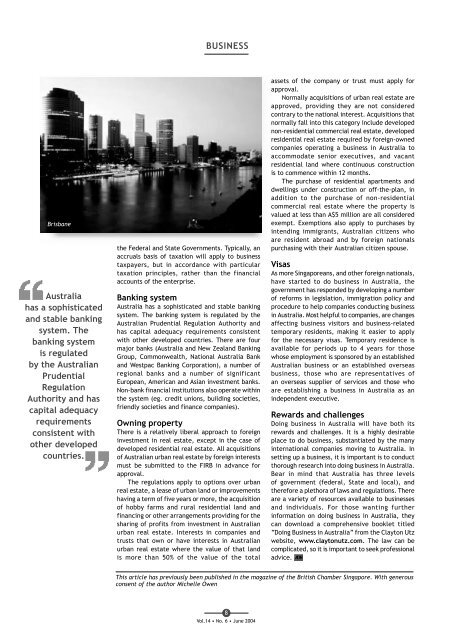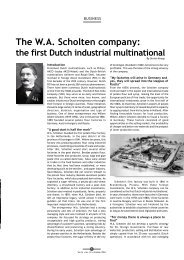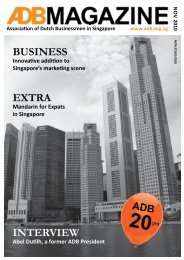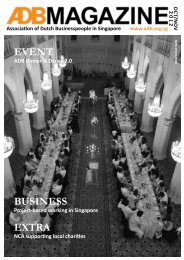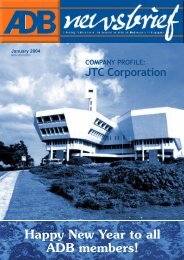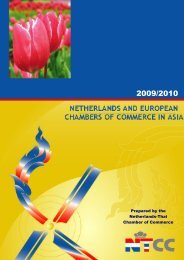June 2004 - Association of Dutch Businessmen
June 2004 - Association of Dutch Businessmen
June 2004 - Association of Dutch Businessmen
Create successful ePaper yourself
Turn your PDF publications into a flip-book with our unique Google optimized e-Paper software.
BUSINESS<br />
Brisbane<br />
Australia<br />
has a sophisticated<br />
and stable banking<br />
system. The<br />
banking system<br />
is regulated<br />
by the Australian<br />
Prudential<br />
Regulation<br />
Authority and has<br />
capital adequacy<br />
requirements<br />
consistent with<br />
other developed<br />
countries.<br />
the Federal and State Governments. Typically, an<br />
accruals basis <strong>of</strong> taxation will apply to business<br />
taxpayers, but in accordance with particular<br />
taxation principles, rather than the financial<br />
accounts <strong>of</strong> the enterprise.<br />
Banking system<br />
Australia has a sophisticated and stable banking<br />
system. The banking system is regulated by the<br />
Australian Prudential Regulation Authority and<br />
has capital adequacy requirements consistent<br />
with other developed countries. There are four<br />
major banks (Australia and New Zealand Banking<br />
Group, Commonwealth, National Australia Bank<br />
and Westpac Banking Corporation), a number <strong>of</strong><br />
regional banks and a number <strong>of</strong> significant<br />
European, American and Asian investment banks.<br />
Non-bank financial institutions also operate within<br />
the system (eg. credit unions, building societies,<br />
friendly societies and finance companies).<br />
Owning property<br />
There is a relatively liberal approach to foreign<br />
investment in real estate, except in the case <strong>of</strong><br />
developed residential real estate. All acquisitions<br />
<strong>of</strong> Australian urban real estate by foreign interests<br />
must be submitted to the FIRB in advance for<br />
approval.<br />
The regulations apply to options over urban<br />
real estate, a lease <strong>of</strong> urban land or improvements<br />
having a term <strong>of</strong> five years or more, the acquisition<br />
<strong>of</strong> hobby farms and rural residential land and<br />
financing or other arrangements providing for the<br />
sharing <strong>of</strong> pr<strong>of</strong>its from investment in Australian<br />
urban real estate. Interests in companies and<br />
trusts that own or have interests in Australian<br />
urban real estate where the value <strong>of</strong> that land<br />
is more than 50% <strong>of</strong> the value <strong>of</strong> the total<br />
assets <strong>of</strong> the company or trust must apply for<br />
approval.<br />
Normally acquisitions <strong>of</strong> urban real estate are<br />
approved, providing they are not considered<br />
contrary to the national interest. Acquisitions that<br />
normally fall into this category include developed<br />
non-residential commercial real estate, developed<br />
residential real estate required by foreign-owned<br />
companies operating a business in Australia to<br />
accommodate senior executives, and vacant<br />
residential land where continuous construction<br />
is to commence within 12 months.<br />
The purchase <strong>of</strong> residential apartments and<br />
dwellings under construction or <strong>of</strong>f-the-plan, in<br />
addition to the purchase <strong>of</strong> non-residential<br />
commercial real estate where the property is<br />
valued at less than A$5 million are all considered<br />
exempt. Exemptions also apply to purchases by<br />
intending immigrants, Australian citizens who<br />
are resident abroad and by foreign nationals<br />
purchasing with their Australian citizen spouse.<br />
Visas<br />
As more Singaporeans, and other foreign nationals,<br />
have started to do business in Australia, the<br />
government has responded by developing a number<br />
<strong>of</strong> reforms in legislation, immigration policy and<br />
procedure to help companies conducting business<br />
in Australia. Most helpful to companies, are changes<br />
affecting business visitors and business-related<br />
temporary residents, making it easier to apply<br />
for the necessary visas. Temporary residence is<br />
available for periods up to 4 years for those<br />
whose employment is sponsored by an established<br />
Australian business or an established overseas<br />
business, those who are representatives <strong>of</strong><br />
an overseas supplier <strong>of</strong> services and those who<br />
are establishing a business in Australia as an<br />
independent executive.<br />
Rewards and challenges<br />
Doing business in Australia will have both its<br />
rewards and challenges. It is a highly desirable<br />
place to do business, substantiated by the many<br />
international companies moving to Australia. In<br />
setting up a business, it is important is to conduct<br />
thorough research into doing business in Australia.<br />
Bear in mind that Australia has three levels<br />
<strong>of</strong> government (federal, State and local), and<br />
therefore a plethora <strong>of</strong> laws and regulations. There<br />
are a variety <strong>of</strong> resources available to businesses<br />
and individuals. For those wanting further<br />
information on doing business in Australia, they<br />
can download a comprehensive booklet titled<br />
“Doing Business in Australia” from the Clayton Utz<br />
website, www.claytonutz.com. The law can be<br />
complicated, so it is important to seek pr<strong>of</strong>essional<br />
advice.<br />
This article has previously been published in the magazine <strong>of</strong> the British Chamber Singapore. With generous<br />
consent <strong>of</strong> the author Michelle Owen<br />
8<br />
Vol.14 • No. 6 • <strong>June</strong> <strong>2004</strong>


